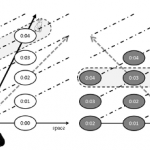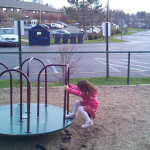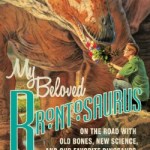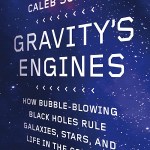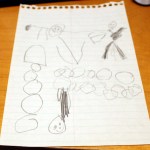
SteelyKid takes a bunch of enrichment classes at her day care, none of which are explicitly science. I was, however, thrilled to discover that they were doing actual science in her computer class though. The "Featured Image" at the top of this post (sorry, RSS readers, you'll need to click through) is a cell-phone picture of the worksheet she brought home the other day. Apparently, they made a computer-controlled Lego robot to kick a ball, and measured its performance, as recorded in the table in the picture (keep in mind, she's 4.75 years old, so some letters and numbers occasionally undergo…
Last year, Alan Alda posed a challenge to science communicators, to explain a flame in terms that an 11-year old could understand. this drew a lot of responses, and some very good winners. This year's contest, though still called the "Flame Challenge," asked for an answer to the question "What Is Time?"
This is a little closer to my corner of science, so I considered entering, but as previously noted, I'm crushingly busy at present. And either scripting/ shooting/ editing a video, or doing the necessary work to hack a written response down to the prescribed 300 characters was more time than I…
The playground outside SteedlyKid's day care, amazingly in this litigious age, has a merry-go-round, a rotating disc with a really good bearing. The kids can really get the thing flying, which is kind of terrifying at times. But on the bright side, it's an excellent venue for the physics of angular momentum:
In the embedded video, SteelyKid runs in and starts the merry-go-round spinning, then jumps aboard and goes around one full rotation before moving to the center for a few rotations, and then starting to move back out.
This isn't exactly what I was hoping for-- amazingly, a four-and-two-…
In the car, on the way from day care to campus to watch a softball game
DADDY: So, what did you do at school today?
STEELYKID: Daddy, I'm a superhero. They call me Strong Ninja Girl. Strong World-Saving Ninja Girl.
DADDY: Because you save the world?
STEELYKID: Right. And M____ is World-Saving Rainbow Girl. And O____ is Silly Super Boy.
DADDY: Silly Super Boy?
STEELYKID: Yeah, because he just goes {Silly voice} "Bah, bah, bah, bah, bah" and distracts the bad guys. Then M___ and I sneak up behind them, and say "Hey! Bad guys! We can turn you into good guys!" And then we do that, and we save the…
A couple of days ago, Alom Shaha posted on the new Physics Focus blog (by the way, there's a new Physics Focus blog...) about his dissatisfaction with some popular books:
I recently read a popular science book on a topic that I felt I needed to learn more about. The book was well written, ideas were clearly explained, and I finished the book knowing a lot more about the history of the subject than beforehand. However, I don’t feel I understand the key ideas in the book any better. I won’t mention the name of the book or the author because this post isn’t really about that specific book. It’s…
Nobody's ever going to mistake me for an elite basketball player. I'm taller than average (about 6'6", a hair under 2m in SI units), but I'm not especially quick, or agile, or all that good a jumper. And I'm carrying at least 40lbs of extra weight above what a really good player my size would (in terms of mass, I'm closer to the dimensions of a really good (American) football player, though not nearly enough of it is muscle).
This doesn't stop me from playing basketball, though. I love the game, and I play a good deal, at least for a guy in his forties with a full-time job. I can hold my own…
I was re-reading bits of James Gleick's Feynman biography, and ran across a bit near the end (page 397 of my hardcover from 1992) talking about his relationship with his children, talking about how ordinary he seemed at home.I particularly liked the sentence "Belatedly it dawned on them that not all their friends could look up their fathers in the encyclopedia." It occurred to me that that would be a good line for an obituary.
This is not due to any particularly morbid cast of mind on my part, but lingering blowback from the kerfuffle over the New York Times obituary for Yvonne Brill a couple…
One of the reasons I held off on commenting on the whole E. O. Wilson math op-ed thing, other than not having time to blog, was that his comments were based on his own experiences. And, you know, who am I to gainsay the personal experiences of a justly famous scientist?
At the same time, though, this is one of the big things that makes the original piece so frustrating. He's speaking from his personal experience, but it feels like he's chosen to draw exactly the wrong lessons from it. The relevant anecdotes are:
During my decades of teaching biology at Harvard, I watched sadly as bright…
One of the hot topics of the moment is the E. O. Wilson op-ed lamenting the way math scares students off from science, and downplaying the need for mathematical skill (this is not news, really-- he said more or less the same thing a few years ago, but the Wall Street Journal published it to promote his upcoming book). This has raised a lot of hackles in the more math-y side of the science blogosphere, while some in less math-y fields (mostly closer to Wilson's home field of evolutionary biology) either applaud him or don't see what the fuss is about.
The split, I think, comes from the fact…
For something related to the book-in-progress, I was reading Raymond Chandler's classic essay "The Simple Art of Murder" last night, and stumbled across the following quote, where he laments the number of stories in print in the mystery genre in 1950:
In my less stilted moments I too write detective stories, and all this immortality makes just a little too much competition. Even Einstein couldn’t get very far if three hundred treatises of the higher physics were published every year, and several thousand others in some form or other were hanging around in excellent condition, and being read…
Back in January, thinking about science topics to add to the book-in-progress, it occurred to me that I would really be letting down SteelyKid (and pre-schoolers everywhere) if I didn't take the opportunity to include something about dinosaurs. The problem with that, of course, is that I know next to nothing about dinosaurs, especially discoveries made since, say, 1981 or so. I remembered, however, that blogger extraordinaire Brian Switek had written a book about the latest on dinosaurs, My Beloved Brontosaurus. Sadly, a quick trip to Amazon revealed that it wasn't out yet, and in fact won't…
I saw Maria Konnikova's Mastermind on the book lottery stacks at Science Online, and the subtitle "How to Think Like Sherlock Holmes" practically screamed "This is relevant to your interests!" Not only am I writing a book about how to think like a scientist, one of the chapters I have in mind uses mystery novels and the reading thereof as an example of scientific thinking.
I didn't score a copy of it at Science Online, but I did pick up the ebook shortly thereafter, and have been working through it during baby bedtimes for the last month or so, a process prolonged significantly by having to…
Last week, I gave my evangelical talk about science blogging to the Physics department at Wright State, and also a lot of education students who came to the talk (which made a nice change in the sort of questions I got). It's basically this talk that I gave at Cornell a couple of years ago, with a few updates to the slides that don't require a new upload to SlideShare:
Talking to My Dog About Science: Why Public Communication of Science Matters and How Social Media Can Help from Chad Orzel
The pitch that I make, if you don't want to flip through the slides, is that communicating to a…
The last week or so of silence on the blog has been due to my trip to Ohio (which was very enjoyable), and a lack of child care for the early part of this week. A day and a half home with both kids was just exhausting, but the trip was useful in that it provided me time to read Gravity's Engines by Caleb Scharf, on the plane to and from Columbus (I got the paper edition at Science Online, and figured as long as I had a printed book I wanted to read, I might as well dodge the stupid argument about whether my Nook is likely to interfere with the plane's navigation systems).
This book comes with…
The Pip is getting really into books these days, and SteelyKid has been into them for a good while now (she's four-and-a-half, after all...). At some point last week, she asked about my writing, so I got down a copy of How to Teach Relativity to Your Dog and showed her her name in the dedication, which she was tickled by (she now refers to it as "my book"). Encouraged by this, I read a bit to them both-- the dog dialogue from the first chapter, which started life as this old blog post-- doing the silly dog voice. SteelyKid giggled in the right places, more or less, and The Pip listened very…
It's been a while since I've done a post over-analyzing some everyday situation, because I've been too busy to do any silly experiments. We're on break this week, though, so I took a little time Monday to bring excessive technology to bear on the critically important scientific question: how good is my insulated Starbucks cup?
To back up a little bit, because it's always important to provide background and motivation when writing a lab report, I spend a lot of time working at Starbucks these days, because when I try to get work done in my office, people keep showing up wanting me to do stuff…
Over at Unqualified Offerings, Thoreau has a bit of a rant about what students perceive as grading on a "curve":
Moreover, many students have only the foggiest idea of what a curve is. Many (though probably not all) of their high schools had fixed grading scales with fixed percentages for each letter grade. The A/A- range is 90% or above, or 85% or above, or whatever. The B+/B/B- range is whatever percentage range below that. And so forth. If we set the grade markers anywhere below the ranges they saw in high school, that constitutes “a curve” in their eyes. We could base those ranges…
Kind of short notice, but if you're in the appropriate bits of Ohio, you might be interested to know that I'm giving two talks at Wright State this Thursday. At 11am, I'm doing the Physics Department Colloquium in 202 Oelman Hall, "Talking to My Dog About Science: Why Public Communication of Science Matters, and How Social Media Can Help":
Budget cuts and funding instability are a constant source of anxiety for professional scientists, and public uncertainty about science threatens to derail critical policy actions in areas like climate change and public health. I will argue that these…
OK, here's my idea: We put a leash on Emmy and we put her up on top of this rock that's on top of all these other rocks. Then she jumps down into these petals. so she'll be safe. And you pull on the leash so she jumps down a little faster.
I'm down here on the bottom. This is my arm, holding this petal. And this is my face. I'm holding the petal for Emmy to jump down into the petals, so she'll be safe.
The plan for tomorrow
The Story of How Do Grasshoppers Run Away?
Once upon a time there was a grasshopper, and a grasshopper friend. They went to a lake to get a drink, and one of the…
Yesterday's big post on why I think people should embrace scientific thinking in a more conscious way than they do already (because my claim is that most people already use scientific thinking, they're just not aware that they're doing it) is clearly a kind of explanation of the reason behind my next book, but what about the previous two? How does teaching people about modern physics through imaginary conversations with my dog serve the general goal of getting people to think more scientifically?
The following is a bit of a retcon-- after all, the proximate cause of my writing those books was…

